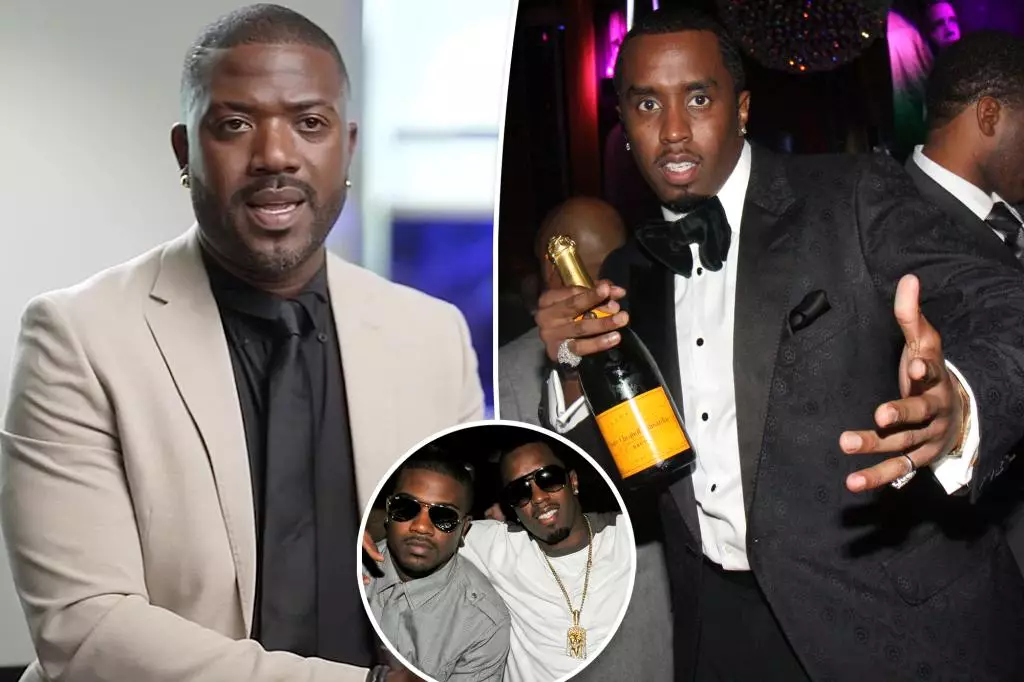In a striking revelation during an interview with TMZ, Ray J, the 43-year-old musician and reality television star, broke his silence on the enigmatic world of high-profile sexual misconduct. Speaking to veteran journalist Harvey Levin, Ray J shared insights that cast a shadow over Sean “Diddy” Combs, suggesting a culture rife with secrecy among celebrities. The striking phrase “too much” seemed to encapsulate his reluctance to delve deeper, albeit his claims opened a Pandora’s box of implications surrounding Diddy’s alleged misdeeds.
Ray J articulated a theory that suggests a pervasive culture of silence maintained through financial agreements, colloquially referred to as “catch and kills.” His assertion is not merely anecdotal; it highlights a harsh reality where victims may feel compelled to remain silent in exchange for monetary compensation, allowing perpetrators to escape accountability. For Ray J, this systemic behavior appears to be prevalent, creating a façade that allows powerful figures like Diddy to thrive while victims suffer in silence.
The Web of Secrets
Ray J’s commentary prompted significant questions about celebrity culture and the dynamics of power in relationships. He claimed that individuals trickle into his life, seeking comfort in sharing their experiences with Diddy, revealing a network of unspoken fears and hidden narratives. The implication that these supposed victims view Ray J as a confidant points toward a community burdened by the weight of their experiences. It is an indictment not only of Diddy but also of an entertainment industry that often prioritizes reputation over the truth.
Levin’s follow-up questions sought clarity on whether these victims are fearful of public exposure due to their affiliation with a powerful mogul. Ray J’s candid affirmation suggests a gnawing trepidation among A-listers who feel that their public image is at stake. This speaks to a chilling reality: the fear of being vilified or disregarded often hampers the willingness to come forward, even when such actions may result in justice for those victimized.
The legal landscape surrounding Diddy has become tumultuous amidst these revelations. Charged with serious offenses, including sex trafficking and prostitution, the music mogul has pleaded not guilty, asserting his innocence. However, the very nature of the allegations introduces a need for scrutiny, compelling societal standards around accountability, especially for influential figures. Notably, prominent attorney Tony Buzbee has emerged in this case, representing multiple alleged victims, and has indicated that the unraveled truth may cast a broader net, implicating other notable individuals within Diddy’s circle.
Buzbee’s promise to expose “enablers” behind the scenes only heightens the intrigue. It points to a systemic failure that allows misconduct to flourish—a culture where protective layers insulate offenders. Should Buzbee’s comments yield any credible leads, the fallout could extend far beyond the current accusations against Diddy, drawing in figures from the very heart of the music and entertainment industries.
Ray J’s comments also invoke a greater discussion surrounding the ethics of celebrity gossip and the sometimes darker sidesteps of fame. In an industry where stars convene at lavish parties, the notion that they might need to flee amid a “turn” hints at a perilous double life. Such portrayals can impact public perception drastically, perpetuating a narrative where glamour is undermined by grim realities.
This complicated entanglement of fame, power, and secrecy raises essential moral questions about complicity and silence. The concept of “freak-offs,” as Buzbee has termed it, suggests an underground culture that intertwines sexual allure with exploitative practices. As these claims surface, they force us to confront uncomfortable truths about the very structures that govern celebrity interactions and beyond.
In a world where light often obscures dark dealings, the struggle for victims to reclaim their narratives is ongoing. Ray J’s revelations serve as a critical reminder of the pervasive secrets lurking behind the glitz and glamour of celebrity life. His struggle to voice the truth compels us to reflect deeply on who benefits from silence and who suffers from it. As the legal proceedings against Diddy unfold, and as more voices potentially come forward, it remains to be seen whether the walls of silence will finally crumble, allowing justice to prevail in an industry long cloaked in secrets and shadows.

Leave a Reply